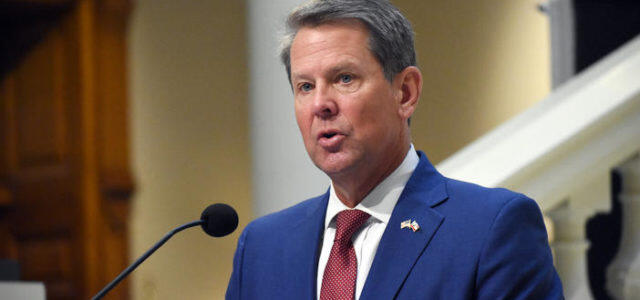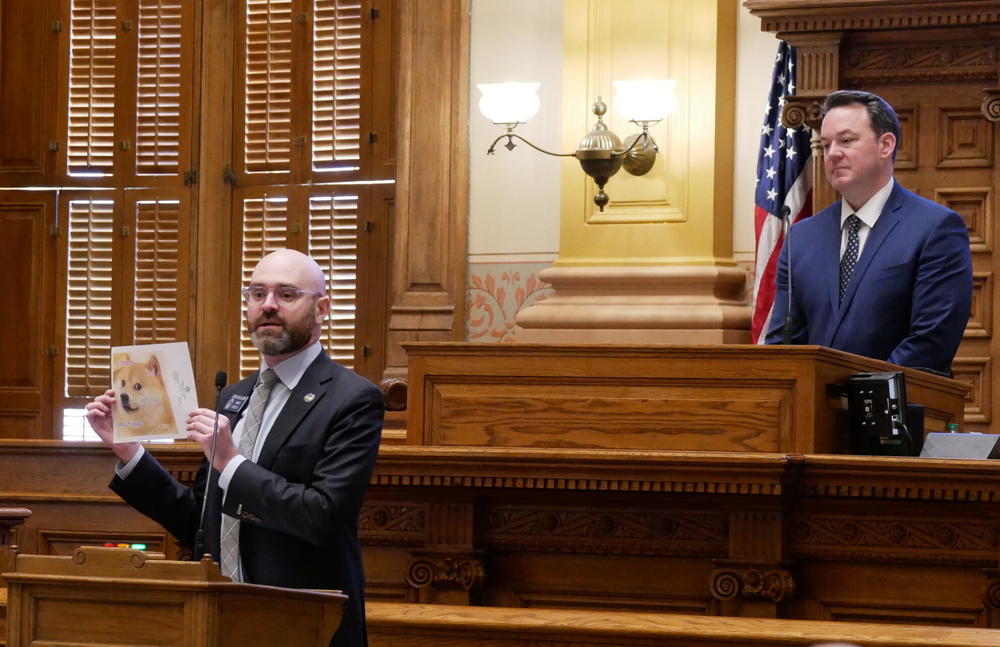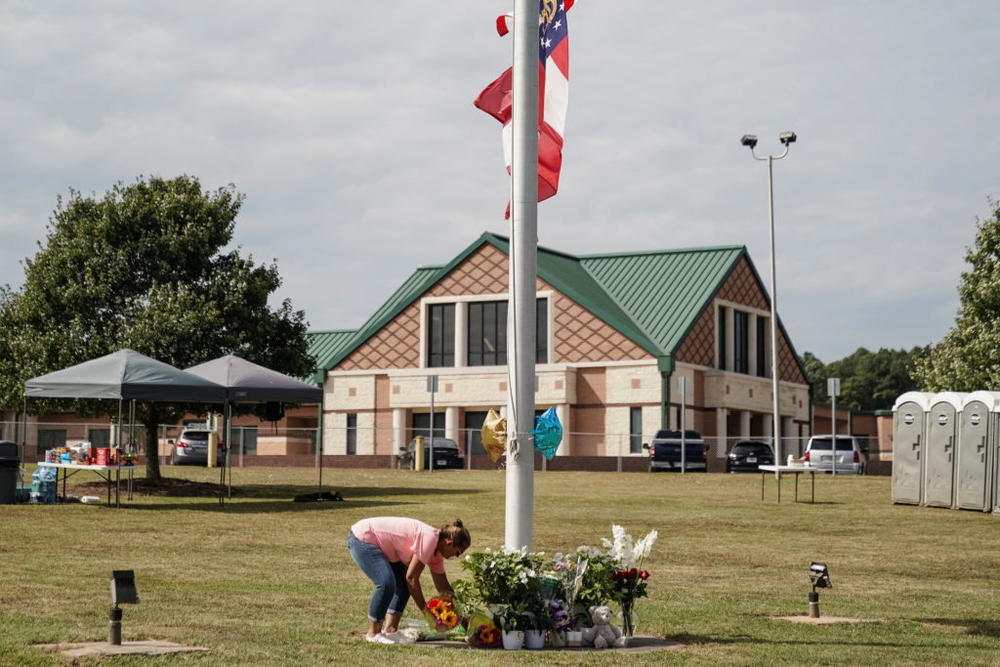
Section Branding
Header Content
Georgia Today: High-speed police chase policy; Alleged Apalachee HS shooter court appearance
Primary Content
On the Tuesday, May 6 edition: The Atlanta City Council calls for stricter guidelines around high speed police chases; the accused Apalachee High School shooter appears in court; what Gov. Brian Kemp's decision not to run for senate could mean for the midterm elections.

Orlando Montoya: Hello and welcome to the Georgia Today podcast. Here we bring you the latest reports from the GPB newsroom. On today's episode, the Atlanta City Council calls for stricter guidelines around high-speed police chases, the accused Apalachee High School shooter appears in court, and a Georgia political strategist weighs in on what Gov. Brian Kemp's decision not to run for U.S. Senate could mean for the midterm elections.
Bill Crane: If he had decided to be the nominee, it would have been an extremely competitive race with incumbent Sen. Ossoff. More of a toss-up now, not knowing who the GOP nominee will be.
Orlando Montoya: Today is Tuesday, May 6. I'm Orlando Montoya, and this is Georgia Today.

Story 1:
Orlando Montoya: Gov. Brian Kemp announced yesterday that he will not make a run for the U.S. Senate in 2026. His decision sets off what's likely to be a competitive Republican race, with multiple candidates seeking to take on the incumbent Democratic U. S. Sen. Jon Ossoff. The GOP considers Ossoff to be a top target in the midterms. Here to talk about what this decision might mean is longtime Georgia political strategist and commentator Bill Crane. Thanks for joining me today.
Bill Crane: Good to be with you.
Orlando Montoya: Governor Kemp wrote in his statement yesterday that running would be quote "not the right decision for me and my family." Do you think this was a personal and family decision or at least partly political?
Bill Crane: I think, um, and majority, a family decision. His wife, first lady Marty Kemp, is probably his closest personal friend and advisor. They have three daughters, one of whom just got married. The other two are not far behind in that regard. I know Marty's already thinking and picturing grandchildren. The idea of living in Washington was never something that the Kemp family was all that enamored of. Gov. Kemp also prefers the executive model. He served in the state Senate, but he felt like he was more effective as secretary of state, certainly as governor. And then in the prior private sector previously, he was a home builder and developer. So he's very much used to being kind of in charge. So I do think it was more driven by personal factors. Politically speaking, I think if he had decided to be the nominee, it would have been an extremely competitive race with the incumbent Sen. Ossoff. More of a toss-up now, not knowing who the GOP nominee will be and knowing it'll be a very spirited primary, both for Senate and the governor's race. And not having Gov. Kemp on the ballot at all, nor Donald Trump, may impact turnout for Republicans.
Orlando Montoya: There's a long list of potential Republican candidates who could step into this race to challenge Sen. Ossoff. Can you talk about who they are and which voters they might animate in the GOP?
Bill Crane: Among the more polarizing candidates, but who will also have both a financial base, name ID, and a draw: Marjorie Taylor Greene. She's already been looking at the race. Then, former U S Sen., now Small Business Administrator Kelly Loeffler is looking at making a runoff or attempt at the race — and she bested Jon Ossoff in the general election, but didn't win outright and then lost to him and the runoff. John King, the state's insurance commissioner, who is also the first statewide Latino elected official is eyeing the race, as is Secretary of State Brad Raffensperger. So we have two constitutional officers with some statewide name ID. Congressman Mike Collins, congressman Buddy Carter down in the first congressional district down on the coast, and doctor and congressman Rich McCormick, who's an M.D., who is one of two practicing doctors in Congress who represents the 6th Congressional District.
Orlando Montoya: Jon Ossoff's campaign manager wrote in response to yesterday's decision that, quote, "Senator Ossoff is well prepared to defeat any challenger." But as a Democrat in a state that Trump won in 2024, is he vulnerable?
Bill Crane: He is vulnerable. I think he's one of the most vulnerable Democratic incumbents in the U.S. Senate. But part of that vulnerability, he's very good at constituent services. He's very good at reaching out across the aisle and being a pragmatic politician sometimes, as it results in actual legislation, not just bombast and talk in front of a microphone in the U.S. Senate. But he has injured his own relationships with a couple of key constituencies within the Democratic Party. His positions on the war in Israel with Hamas have disappointed some in the Jewish community. Sen. Ossoff himself is Jewish. And even though it was intended as a private conversation, he reached out to Nikema Williams, the 5th District congresswoman and then-chair of the Democratic Party, after the results of November's 2022 election — or 2024's election, and sort of expressed some disappointment in the way some resources were deployed here in Georgia and questioned if a person should be holding elective office, in this case a congressional seat, and chairing the party, if that was a good idea. Congresswoman Williams decided to go public with that expression of dissent, and so you had one of our two United States senators questioning the leadership of an African American female who chairs the party and who is the congressional representative of our capital city. And the largest constituency the Democratic Party needs for enthusiastically turning out in a general election are African American women. So I think there's time for him to heal those wounds. And he's certainly trying to do that with some of his direct mail and campaign fundraising literature in terms of the issues he's speaking to. But in politics, sometimes bruised egos last longer than they might should. And I don't know if they'll have all of that healed by the fall of '26.
Orlando Montoya: Georgia political strategist and commentator Bill Crane, thanks for your expertise and your being with us today. Thank you very much.
Take care.
Story 2:
Orlando Montoya: The Atlanta City Council is calling for stricter guidelines around the Georgia State Patrol's high-speed chases within the city. GPB's Amanda Andrews reports the suggested policies are aimed at saving lives.
Amanda Andrews: The recommended changes include restricting chases to instances of violent felonies, requiring supervisor approval, and banning PIT maneuvers in densely populated areas. Reporting from the Atlanta Journal-Constitution found more than half of the GSP's 6,700 chases ended in a crash. Kate Scohenke spoke at the meeting about her son Cooper, a bystander who was killed in a state patrol chase in April.
Kate Schoenke: That could have been a family going to Target. 80 miles an hour down that road, heavily populated, it's just, it's not the first time this has happened. I'd love it to be the last.
Amanda Andrews: Council has called on the Atlanta Police Chief to return within 60 days to report on policy changes they've made for working with GSP. For GPB News, I'm Amanda Andrews.

Story 3:
Orlando Montoya: A Georgia state senator representing a district north of Atlanta traveled to Savannah yesterday to announce he's running for lieutenant governor. GPB's Benjamin Payne reports on the candidacy of Sandy Springs Democrat Josh McLaurin.
Benjamin Payne: Standing along River Street with the Port of Savannah looming in the background, McLaurin said next year's race would serve as a referendum on the Trump administration, especially its policy of tariffs.
Josh McLaurin: Savannah, Ga., is the front line in the war that Georgia should be fighting against these senseless tariffs. But right now our state leaders are doing anything but stand up to Trump's tariffs. If anything, they are sucking up to Trump and trying to pretend that everything that he's doing is hunky dory.
Benjamin Payne: The port of Savannah is the East Coast's second-busiest port, which McLaurin said sources roughly a third of its imports from China. Goods from that country are currently subject to a 145% levy under Trump's tariff policy, which McLaurin called a quote, "needless tax on consumers and working people." For GPB News, I'm Benjamin Payne in Savannah.

Story 4:
Orlando Montoya: The Apalachee High School student accused of shooting and killing two teachers and two students was in court this morning. His attorney seemed to indicate his client could plead guilty later in the fall. GPB's Chase McGee has more.
Chase McGee: Defense attorney Alfonso Kraft told Barrow County Superior Court Judge Nick Prim that Colt Gray could be ready for a plea hearing in October, after a report from a psychologist was completed. Earlier, state attorneys asked if the defense was ready to schedule a non-negotiated plea, where Gray would admit guilt to the shooting, but sentencing would remain up to the judge. Judge Prim also noted that the plea would not conflict with his father Colin Gray's trial for providing the rifle used in the shooting.
Judge Nick Prim: I think the October timing works well because Colin Gray's trial is scheduled in September. And in order to avoid any publicity tainting that trial, it would make sense to do the plea after.
Chase McGee: It's unclear if Colt Gray would face a sentence with or without possibility of parole, but as a juvenile, he will not receive the death penalty. For GPB News, I'm Chase McGee in Winder.
Story 5:
Orlando Montoya: Prominent civil rights attorney Ben Crump is filing a lawsuit against a former Florida sheriff's deputy and others for last year's shooting death of a 23-year-old airman from Atlanta. U.S. Senior Airman Roger Fortson was shot and killed at the back door of Fortson's apartment in Fort Walton Beach, Fla. The lawsuit alleges that the deputy used excessive deadly force when he shot Fortson within seconds of the door opening. The deputy was fired after an investigation concluded his life was not in danger when he shot Fortson.
Story 6:
Orlando Montoya: Atlanta has returned to clearing homeless encampments after a 45-day moratorium. City officials temporarily halted clearings after a city crew, using heavy construction equipment, fatally crushed a man during a January sweep of one encampment. The death of Cornelius Taylor sparked outrage in the community. Crews using earth-moving equipment yesterday cleared tents and other items used by dozens of unhoused people under Interstate 20 near downtown
Story 7:
Orlando Montoya: Georgia taxpayers contributed more than $74 million to rural hospitals last year as part of a state tax credit program. The State Department of Audits and Accounts reported the numbers yesterday. Thirty-four of the 54 eligible hospitals received more than $1 million each. The General Assembly launched the tax credit programs in 2017, allowing taxpayers to their state income tax liability by the amounts they donate. The amount goes to hospitals in counties with populations of 50,000 or fewer. In 2023, hospitals reported that most of the money they received through the program was spent on capital projects or regular operating expenses.
Story 8:
Orlando Montoya: Among the ideas in President Trump's proposed federal budget is completely ending the National Endowment for the Humanities. The NEH already has seen its $200 million allotment zeroed out by the administration's Department of Government Efficiency. That's money used to support arts and culture in all 50 states, including Georgia. GPB's Grant Blankenship has more.
Joy Harjo: Thank you for that welcome.
Grant Blankenship: From a podium in the volleyball gym at Middle Georgia State University in Macon, former U.S. Poet Laureate Joy Harjo —
Joy Harjo: I want to give you this as it was given to me.
Grant Blankenship: — Reads.
Joy Harjo: Gifts of inspiration often come when we don't expect it, when we need it.
Grant Blankenship: And when she's done, the nation's first Native American poet laureate takes questions from the audience, like this one from Howard High School student Soul Harmon: If you had a biopic, what would it be called?
Joy Harjo: So it would be maybe, "Dancing With My Mother In The Kitchen." That would be it. And what about you?
Grant Blankenship: And with that, a question becomes a conversation.
Soul Harmon: And I've read this poem called "Weeping Willow." So it would probably be like that. Like, it's how it's like beauty, but it went through a journey.
Joy Harjo: Oh cool. My mother wrote a song called "Weeping Willow."
Soul Harmon: Oh, that's dope.
Joy Harjo: Yeah, yeah. She did. And she wrote on this album.
Grant Blankenship: The two of them, they really connect. Soul felt it.
Soul Harmon: I feel like we was vibing, yeah.
Grant Blankenship: Soul says this morning she was done with poetry after "Weeping Willow." It was just too painful. But after talking to Joy Harjo —
Soul Harmon: Poetry really is dear to me, so I guess that might be a segue.
Grant Blankenship: This may have changed your life.
Soul Harmon: Yeah, absolutely.
Grant Blankenship: She says she wasn't expecting that on a Thursday. Mary McCartin-Wearn says that was the plan all along.
Mary McCartin-Wearn: I worked very hard to get those students into that room because they don't know they want to be there until they get there.
Grant Blankenship: Wearn is the new president of the Georgia Humanities Council, the nonprofit which, alongside the college and other partners, brought Harjo here.
Mary McCartin-Wearn: What we are is we're connectors and conveners.
Grant Blankenship: That takes money. When DOGE zeroed out the budget for the National Endowment for the Humanities, that took Georgia Humanities' annual operating budget of about one and a half million dollars with it. That's about 15 cents per Georgian per year.
Mary McCartin-Wearn: Overnight we lost all of that money.
Grant Blankenship: Some of which they've spent, but now they won't be reimbursed for. Like for the annual National History Day, where young people from across the state present research projects, and help resurrect voices from the past.
Chester Davis (recording): ... And we welcome you to the Hay House.
Grant Blankenship: That's a recording from 1979 of Chester Davis, the first tour docent at Macon's opulent Civil War-era Italian-style mansion, the Hay House, owned by the Georgia Trust for Historic Preservation. Davis was a driver for the home's owner before he was a tour guide. Hay House director Aubrey Newby says it took about a decade to get the literal proof of the lives of the African Americans like Davis who made this house run out of storage and on full display, which...
Aubrey Newby: ...would probably not have happened to have the Georgia Humanities Grant not been available to us.
Grant Blankenship: Not a big grant, $2,500. Lots of small museums have seen help like that across the state for almost 55 years. Ann McCleary has seen it in her work with Georgia Humanities, bringing Smithsonian exhibits to small town.
Ann McCleary: The communities came together, made up banners, that they could stretch across the road that said "The Smithsonian is here. The Smithsonian is coming."
Grant Blankenship: And when the federal cuts came, she was helping plan an exhibit for 2026 called "Voices and Votes: Democracy in America." Like older exhibits, she expects this one to start conversations.
Ann McCleary: And that is what we need to have. We don't all have to agree, but we do need to talk.
Grant Blankenship: But even an announced donation to the NEH by the philanthropic Mellon Foundation can't undo the federal cuts. And so it's not clear how the Georgia Humanities Council can afford to help those conversations happen. For GPB News, I'm Grant Blankenship in Macon.
Orlando Montoya: And that's it for today's edition of Georgia Today. If you'd like to learn more about these stories, visit GPB.org/news. If you haven't yet hit subscribe on this podcast, take a moment right now and do it. That'll help you to keep us current in your feed. If you have feedback, send that to us at GeorgiaToday@GPB.org. I'm Orlando Montoya and we'll be here again for you tomorrow.
---
For more on these stories and more, go to GPB.org/news



